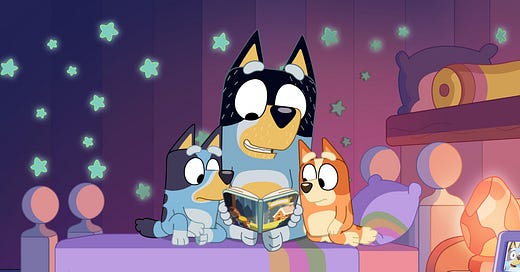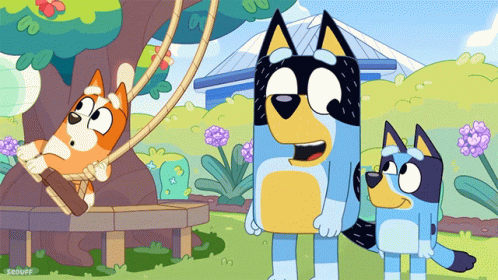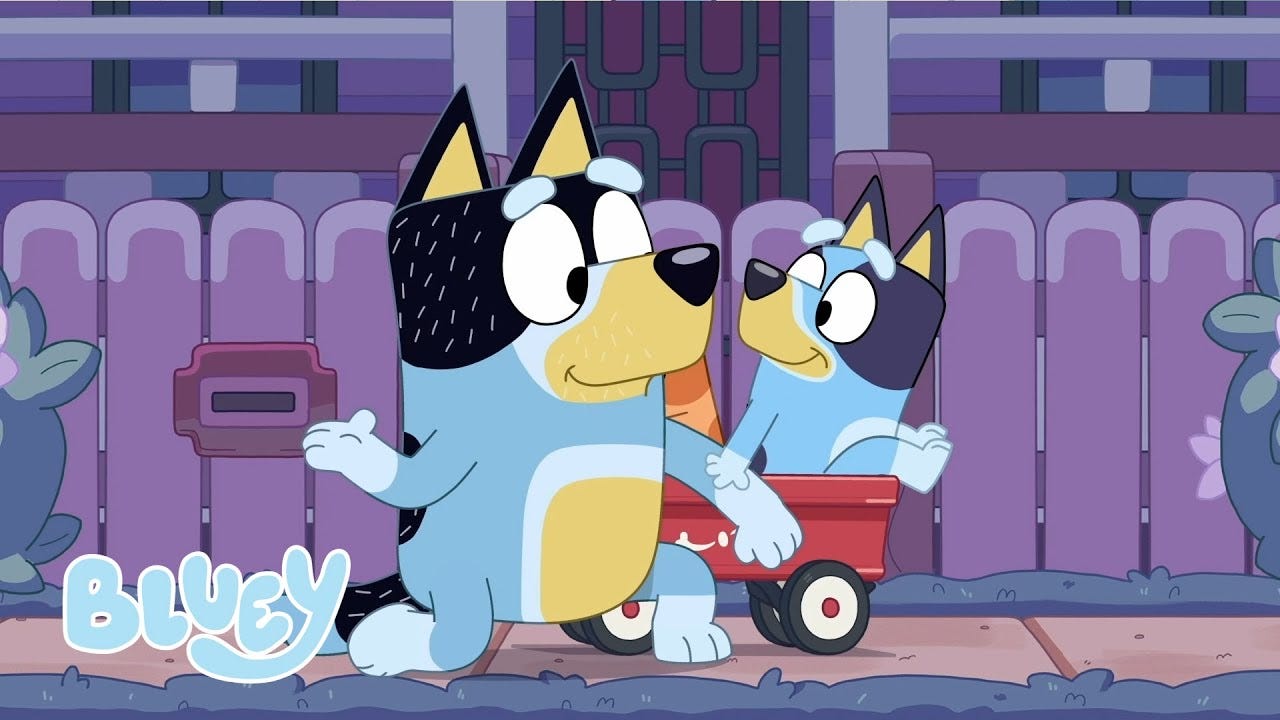It’s quite effortless to recall the exact moment that the (now worldwide) sensation of Bluey entered my universe.
Stepping into the living room, the television played out the kind, yet mildly gravelly, voice of a man. This voice was explaining to a mellifluous girl that should she need his attention, while he was otherwise occupied, to place her hand on his arm, he would know she needed to talk.
Turning about to the screen, what met my eyes did not match what my brain expected, and yet it fit perfectly. A vibrant display of pastels exploded before me as a blue heeler father gently explained to his less than patient child, that annoyed interruptions were not okay, and there were better ways to achieve her goals.
This was not a talking down. It was not a chastisement. It was a moment. A moment in which a thoughtful being considered the child in front of him as another thoughtful being that deserved a moment of education.
It was real talk, as well. There was no baby talk. There was no singing a song to remind ourselves to behave. It was a chat, with a clear description of a problem and a direct solution.
Intrigued, I stopped, sat down and watched the entirety of what remained of the program. And another. Then another.
When I pulled myself away from the screen, I felt different than I had when I entered. Those little dogs had somehow comforted something in me, and as I finally looked around, I saw it had impacted everyone in the room.
The small children who had hardly sat still a moment in their lives, sat motionless, waiting for the next episode, smiling widely. The other adult? They may have had something in their eye. But I doubt it.
The phenomenon of the Bluey series has been meteoric. The Heeler family can be seen the world over, and unlike many other children’s phenomena in the past, this time around, it is the parents of the children watching who seem to be perpetuating its popularity.
Children’s programming is a specific and important part of the education and entertainment of children globally. Growth and development are indeed essential parts of the Bluey program. But the creators have made it clear, Bluey isn’t about counting to 10 and naming colors or shapes. While those things are important, Bluey is about growing as a person, learning about how to face challenges and obstacles, all the while focusing on play for both kids and their adults. What can we learn from this game? What can we learn from this challenge? Maybe, the lesson can sometimes be to stop for a moment and experience the fun. However, the overall intelligence as well as the emotional intelligence of this show is ever present. In episode one, a small child near me was prompted to ask, “what is the ‘rondo a la turca?’”
Bluey first aired October 1, 2018 in Australia, is produced by Ludo, a Queensland based company, and is the brainchild of Joe Brumm. Based much on his experiences as a father of two young girls, we see not only the children growing, but the parents too. His experiences as a father helped Bluey create a monumental pivot in the attitudes of parents who have encountered it.
Bluey brings forward one of the largest paradigm shifts in children’s programing to take place in a long while: a helpful, competent, compassionate father willing to learn and grow with his children. Bucking stereotypes of the bumbling, know-nothing father imagery, or worse; Bandit has become an icon of modern fatherhood.
Mr. Heeler’s casual and relaxed approach to problems allows for something much larger than it seems on its brilliantly pastel surface: it offers an off ramp.
For many parents, especially parents who did not experience as gentle of parentage as the Heeler’s display, it provides examples of ways to deescalate, to redirect, to find solutions.
It also shows how it’s completely okay to talk to your children as people. Kindness without coddling, comfort without condescending.
In addition to Bandit, there is a collection of characters as equally supportive. The show brings us Chili, a strong working mother who loves hockey and a nice long walk alone. She’s a powerful force who, just like her spouse, elects to meet her children with honesty and respect.
Through the program we see that there’s a lot behind the scenes with Chili, including the potential loss of a pregnancy prior to Bluey’s birth. Her attitude of having a good cry, dusting oneself off, and getting back up to try again in the face of defeat reflects the resilience of women the world over. And again, breaking stereotypes, Chili is the spouse off to repair the broken toilet.
True to life, every character is not as sunny as Bandit and Chili. This show does not shy away from a child with impulse control issues, or one testing boundaries during their behavioral development, or those who, maybe, have experienced a bit of spoiling. We observe both adults and children figuring out how to navigate these social challenges and highlight how, even while difficult, it doesn’t change our love for these children. It shows us how to adjust ourselves to meet them where they are and help bring them along to a healthier place.
Young cousin Muffin is an example of this, throwing fits if not receiving a preferred toy, but also can handle being calmly and directly told that while she is special, she’s not the most special person in the world. This talk is difficult for her father, but her behavior is impacting her family negatively, and needs to be addressed.
There are many episodes which show the interconnectivity of our lives and intentions, but few convey it like “Markets.” In this episode we see Bluey, with a nice 5-dollarbuck note in her hand, fresh from the tooth fairy. At the market festival, she struggles to decide on how to spend her only $5. Should she buy herself a treat? How can she best include her dear friend in her fortune? Once decided, she experiences both delight and the regret of buyer’s remorse. But in the background, that choice to spend in her local markets effects her community at once. Changing hands for goods like home-made cakes, home-grown veg, until it works its way to the busker, who is playing music for all to enjoy. Enthused by the $5 tip, Busker plays vibrantly, enticing several market attendees to dance, including, of course, Bandit.
And so a small show like Bluey, with near supernatural emotional intelligence, is being passed from person to person, through a community of parents and non-parents, of children and not-still-children. And it is having huge impacts. It’s empowering families with ideas and choices and the ability to talk about how they feel.
I know this for fact. In my home now, if we feel a hand on our arm, we know someone needs to talk. No words are needed to ask for it, we just, now, know.
Thanks for the tip, Bandit.
This is 🅔. 🅥🅐🅛🅔 🅘🅝🅚🅢.
All imagery created and attributed to Ludo Studios, Disney.







